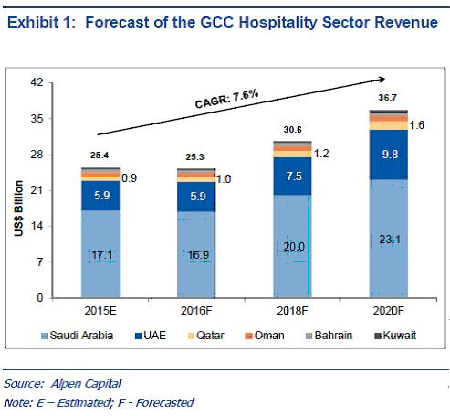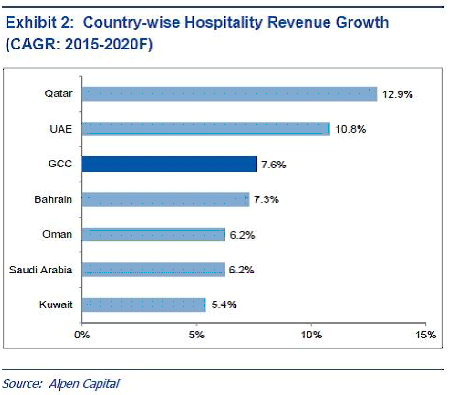Strong fundamentals drive long-term growth of the GCC Hospitality industry, says Alpen Capital in its latest report
All GCC locations, 23rd August, 2016
Alpen Capital, an investment banking advisory firm, announced the publication of its report on the GCC Hospitality Industry. The report presents a synopsis of the demand-supply dynamics and key performance indicators of the hospitality industry across the GCC countries. The report also covers recent trends, growth drivers, and challenges in the industry. It profiles some of the renowned hospitality companies in the GCC while evaluating their financial and market valuation metrics vis-à-vis their regional as well as international counterparts.
“Backed by an active tourism market, the GCC hospitality industry remains firm on its growth trajectory. Though drop in oil prices and currency depreciation is currently affecting demand, the sector’s long-term outlook remains strong. Government measures to bolster tourism activities in the region like encouraging private sector investments, building new attractions, expanding airport capacity, and increasing international promotion campaigns are providing impetus to the growth of the Hospitality sector in the region. A thriving segment of meetings, incentives, conferences, and exhibitions (MICE), spate of technological advancements, and brisk development of midscale hotel properties are amongst the key factors elevating the appeal of the GCC hospitality sector”, says Sameena Ahmad, Managing Director, Alpen Capital (ME) Limited.
“The GCC is witnessing a significant growth in hotel properties, despite the region’s macroeconomic challenges. Several international hotel chains have established significant presence in the region to capture a slice of the burgeoning tourism industry. Massive infrastructure developments and hotel projects are underway to meet the demands of the tourist inflow expected into the region for the upcoming mega events such as Expo 2020 in Dubai and 2022 FIFA World Cup in Qatar. The Hospitality industry continues to present interesting opportunities to investors. We expect consolidation and M&A activity in the Hospitality sector to accelerate given attractive valuations”, says Sanjay Bhatia, Managing Director, Alpen Capital (ME) Limited
Industry Outlook
According to Alpen Capital, the GCC Hospitality market is expected to grow at a 7.6% CAGR from an estimated US$ 25.4 billion in 2015 to US$ 36.7 billion in 2020, despite a slowdown in 2016. However it is anticipated to recover in the long-term with upcoming events, robust fundamentals and government efforts, driving the continual rise in tourist arrivals and a robust pipeline of hotels and serviced apartments.
The key operating metrics of the sector is expected to remain under pressure in the short-term, mainly in the UAE and Qatar, but is likely to rebound in the long-term supported by growing demand.

During the forecast period, occupancy rates at hotels and serviced apartments are anticipated to grow by 3 percentage points (ppts) to 70% and Average Daily Rate (ADR) is likely to increase at a 1.4% annualized rate during the period. As a result, the aggregate Revenue Per Available Room (RevPAR) of hotels and serviced apartments in the GCC is projected to grow at a CAGR of 2.3% to US$ 133 by 2020.
From 2015 to 2020, the hospitality markets of Qatar and the UAE are expected to demonstrate the fastest annualized growth of over 10%, owing mainly to tourism-related developments ahead of landmark events to be held in these countries. Bahrain is likely to deliver growth in line with the regional average backed by tourism promotion activities and recovery in oil prices. Rest of the GCC nations are likely to register growth in the range of 5% to 6%, below the regional average.
During the forecast period, the total room supply in the GCC is expected to grow at a 4.0% CAGR, slower than 5.7% expansion in international tourist arrivals.

Growth drivers
Large-scale international events, upcoming tourist attractions, and a growing MICE market are likely to accelerate tourist arrivals to the GCC region. International tourist arrivals to the GCC are anticipated to grow by 5.7% annually in the five years to 20201
The hospitality industry in the UAE and Qatar are gearing up for expansion in anticipation of a huge inflow of tourists for the mega events namely – the World Expo 2020 to be hosted in Dubai and 2022 FIFA World Cup to be held in Qatar. Significant investments are being channeled into the development of tourism and hospitality related infrastructure to accommodate the expected visitor traffic and provide avenues of entertainment and sightseeing.
The GCC region’s MICE market is growing swiftly, with Dubai being recognized amongst the most popular cities for meetings and events. Acknowledging the opportunity, the other GCC nations are also developing large convention centers and undertaking promotions to attract international summits.
Saudi Arabia – the largest hospitality market and religious tourism center in the GCC – is set to get a boost with major expansion works being carried out at its two holy mosques in Makkah and Madinah.
The tourism sector is seen as one of the key enablers of revenue diversification and job creation in the GCC. Accordingly, governments have framed long-term strategies to develop the sector by building infrastructure, encouraging private investments, and conducting extensive international promotion campaigns.
The GCC countries are expanding capacity at their airports and developing infrastructure to complement the government push for boosting visitor traffic to the region, thus providing a major incentive for increasing hotel capacities.
The GCC region holds one of the largest hotel development pipelines in the world. Driven by the bright prospects of the tourism industry and government support, international hotel chains as well as domestic players have laid down robust hotel and serviced apartment development plans.
Dubai is likely to witness an addition of nearly 57,000 rooms in hotel and serviced apartments in the five years to 2020, whereas Saudi Arabia has a pipeline of over 47,000 rooms. Addition of such massive capacity is expected to extensively scale up the region’s hospitality sector.
Challenges
A slump in the oil prices has slowed down the oil-dependent GCC economies, thus adversely affecting business sentiments and forcing the member countries to resort to austerity measures. Weak economic activity has reduced spending on business travel and MICE events.
Depreciation of currencies such as the Pound, Euro, and Ruble against the US Dollar affected tourism activity in the GCC region, as the currencies of most of the member nations are pegged to the US Dollar. A continued weakness in these currencies is likely to have a negative impact on tourism spend in the GCC region.
Though GCC is a relatively safer haven, the political instability and security threats around the wider Middle East region may impact tourist arrivals.
The GCC region has witnessed the development of several hospitality projects in the last decade, thereby massively increasing the supply of rooms. Demand has not been able to match the rising supply due to weakness in tourist inflow caused by fall in oil prices and devaluation of currencies. This is putting downward pressure on occupancy rates and ADRs.
Although the GCC governments have framed strategic plans to boost tourism activity, failure to attract a continuous flow of tourists prior to and even post the mega events in Dubai and Doha is likely to create an oversupply situation in the host countries’ hospitality sector.
Aggressive expansion by the GCC hoteliers requires a large number of skilled personnel. Hiring the right set of candidates in large numbers is a challenge. Further, the lead-time to train a new employee is also high (around 18 to 24 months for a five-star hotel), thus escalating the problem.
Trends
Growth of mid-market hotels: Growing middle-class population who are budget conscious and demand from corporates who are on a cost-cutting spree have encouraged several top hotel brands in the region to build more mid-range hotels.
Increase in branded hotel apartments: Development of branded hotel apartments is growing in the GCC, given the opportunity and cost advantage. As the GCC nations invest in building leisure attractions to draw more tourists, demand for such apartments is likely to grow.
Growth of wellness tourism: Ageing population, rise in chronic diseases, and growing stress due to a modern lifestyle have invoked the demand for wellness centers. The wellness industry in the UAE, Saudi Arabia, and Oman continues to grow as an increasing number of visitors desire a spa experience.
Growing Shariah-compliant tourism market: Shariah-compliant tourism continues to gain prominence in the GCC owing to the significant demand from regional visitors. Growth in the number of such tourists opens up opportunities for the undersupplied Shariah-compliant hotel market.
Rise in millennial travelers: A rise in the number of millennials globally is compelling the hospitality and tourism industry players to mold their offerings based on behavior, purchasing power, and interest areas of this generation. Millennials are tech-savvy, family-oriented, and travel the most compared to any other age group . Hotel owners are making significant investments into building technology infrastructure for their properties and services to cater to this tech-savvy generation.
Technology platforms gaining importance: Rising number of tech-savvy people and emergence of disruptive technologies have encouraged the use of smart technology, digital solutions, and mobile apps by the hospitality industry to enrich guest experience as well as streamline administrative processes.
Although the GCC hospitality sector may remain under pressure during the year, it is likely to witness a notable growth thereafter in the wake of new business opportunities, mega international events and development of world-class tourist attractions. The immense growth potential of the industry is enticing international and regional players to expand in the region.
Please click here to access the GCC Education Industry report online.
1 Source: MAS, SCAD, MasterCard, Marhaba, Trade Arabia, WTTC, Alpen Capital
 Back
Back